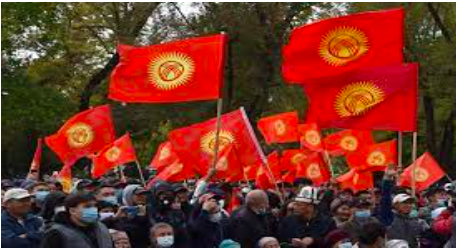Revisiting Kyrgyzstan, a year after protests
Posted on : November 1, 2021Author : Nazia Jafri

With this October a year has passed since protests and demonstrations took place in Kyrgyzstan and changed the entire political scenario. Last year in October Sooronbay Jeenbekov, the then President, declared that an early presidential election would take place on 10 January 2021. The reason behind this sudden announcement was the on-going protests and demonstrations and this ultimately led to the downfall of Jeenbekov, as he resigned soon after. The protesters alleged corruption during the parliamentary elections. He was succeeded by Sadyr Japarov who rose to power with the promise of an improvised democracy. The narrative in the region has changed a lot since then.
Sadyr Japarov was introduced in politics post Tulip revolution in 2005. He was in favour of the revolution and was elected as an MP in the successive elections. However, in 2007 he chose to become advisor to the then, President Kurmanbek Bakiyev. In 2012 he was charged under Article 295 of the Criminal Code of the Kyrgyz Republic and was later released in 2013.
In 2017 he was detained at the Kyrgyz-Kazakh border and was jailed again. During that time in jail he founded his political party Mekenchil and the party gained popularity throughout 2018-19. In January 2021, Sadyr Japarov became President with a massive victory and got almost 80 percent vote.
Since then there have been many alterations in the government. Sadyr Japarov gained Presidency with a lot of assurances to the public and a new constitutional referendum. Though his new constitution was approved in the referendum in April, but has been criticised severely by Human Rights groups for undermining the role of electoral system and increasing the abuse of power in the region. His top-heavy political system is also being questioned by the international community. They criticize this form of government in which there is hardly any encouragement of civic dialogue or questioning the government.
The concentration of power by the government has raised doubts about the status of democracy in the country. The referendum gives major power to the President instead of parliament. Japarov has got his allies with him in the government. And together they impose that their government is working towards anti-corruption. A year has gone by but the concerns that motivated the events last year remains unanswered. The huge promises of the new government are not very visible till this time. Since Japarov gained presidency he has been making new laws and passing bills but the reception of these are not very smooth by the people. His fake news law was highly disapproved by the civil society. On 28 of July, the government sanctioned the legislation to tackle false information. The civil society highly condemns this law as it enhances the power of the government to regulate the information on social media. They believe that this will hamper the freedom of speech and expression in the country. This law among many others have been disapproved by the civil society. Also according to the Fact-Checking Network (IFCN), this law is very similar to Russian legislation of 2014 that controls the usage of information and telecommunication systems.
Freedom House, a civil right institution, assessed in March this year, that modifications in the constitution to such level, “could reshape Kyrgyzstan’s political system in the mould of its authoritarian neighbours.” Notably this year Kyrgyzstan has slipped to not free score by the institution from being partly free last year. However the government does not seem very interested to look back in the past and rectify from there. Back to back this year there have been laws and policies that may have repercussions for the civil society. Another bill has been passed for impeding the functioning of the non-governmental organisations in the region. This year in June, government passed a law that puts certain amount of restrictions on the freedom of the civil society and impedes the work of Non-Governmental Organizations (NGO). The civil society views this as a deliberate attempt to hamper its progress towards corruption and inculcate fear among the independent activists. Media Policy Institute, a human rights institution from Kyrgyzstan, analyse this as rigid use of power and say that these bills have been brought out to “protect the authorities from public criticism”.
Now Kyrgyzstan has gone back to presidential system after being a parliamentary democracy for ten years. Also parliamentary elections are scheduled for November this year, but the issues that inspired the protests last time remains mostly unanswered this year as well. But not everyone is critical of the government and Japarov has also been working constantly towards pleasing people. During elections his one major promise was about nationalization of the Kumtor gold mine. The mine was nationalized on 8 May. Also to negate the criticism the government is trying to project the image of the region being in transitional period.
The upcoming elections are significant. The number of MPs in the parliament has been reduced this time. Out of the ninety remaining seats, 36 will be voted from single-seat districts and the rest 54 seats will be elected by national party lists. There is a lack of clarity in the elections and this concerns political analysts and observers. Also before elections the government has been trying to target both Kyrgyz civil society and the opposition. The November elections will be reflective of the nature of the future government in Kyrgyzstan.
Source:
Civil society development in Central Asia, M. H. Ruffin and D. C. Waugh, 2011.
The Challenges to de-localising constituencies through electoral reform in Kazakhstan and Kyrgyzstan, Esther Somfalvy, 2020.
Uncertainty Perpetuated? The pitfalls of a weakly institutionalized party system in Kyrgyzstan, Central Asian Affairs, Asel Doolotkeldieva1 and Alexander Wolters, 2017.
Eurasianet: https://eurasianet.org/kyrgyzstan-tightens-control-over-ngos-taps-anti-western-sentiment
24kg:
Media Policy Institute, Kyrgyzstan: http://media.kg/
Freedom House, Kyrgyzstan: https://freedomhouse.org/country/kyrgyzstan
Nazia Jafri
Intern Asia in Global Affairs



